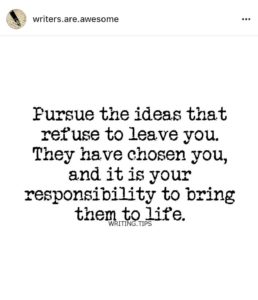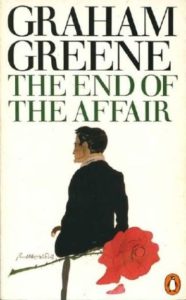The Memoirist’s Dilemma
Every writer struggles with Truth. What is true, what is fact, why is your truth valid rather than someone else’s memory? Navigate the murky waters of life and memory to write your truth.
Every writer struggles with Truth. What is true, what is fact, why is your truth valid rather than someone else’s memory? Navigate the murky waters of life and memory to write your truth.

Writing is about memory, personal truth and the never-ending river of change. A recent scan of Flipboard had the following headline: Christmas at Macy’s Walnut Room. To most, this is an innocent lede about an annual holiday celebration in Chicago. To me, it is a stain on Christmases past.
Childhood Christmases are redolent of my grandmother’s cherry, almond body cream, fresh pine, and the sweets served in Marshall Field’s Walnut Room. We had a special, annual date, just us, tea at the base of the storybook Christmas tree seemingly trimmed by elves. Our trays of dainty sandwiches, shimmering sweets, and warm scones were a personal fairy tale beyond my multicultural and blue-collar neighborhood. Each sip equaled the special love we shared, each cucumber sandwich harkened the possibility of future travel and the sweets spoke of creative aspirations. One Yellow cab ride took me to a magical kingdom that Disney could never replicate. 
Fields was the place to spend tips earned from my Kresge’s lunch counter job. I saved and saved to buy a special dress for a high school dance. Fields sold me my first pair of expensive shoes as a young career woman and it became the place for my special annual Christmas date with my children who found it old fashioned. Sadly, I failed at translating the magic it held and still holds for me today.
Marshall Fields is an echo of Chicago history, a Phoenix fertilized by the ashes of a historic fire, stately on its full city block, accessorized by giant verdigris clocks, stocked with wonders including the celestial Tiffany mosaic above the grand gallery, all impressive to my young self. It continued to be magical as I returned through all phases of my womanhood. 
For me, Macy’s is New York, malls and overstocked floors more jumble than art. I can hear New Yorkers protest and rightly so because Macy’s is their memory. Macy’s acquired Fields in 2005. For months they teased the city about whether they would keep the historic name or change it to Macy’s. Chicagoans held out a helium balloon of hope that suffered a massive coronary with the name change. Is it a coincidence that I left Chicago in 2006?
What does a name change have to do with writing? Everything. It is the human condition to hunger for reconstructed memory while society strives for change. It is the meat of an idea that a writer serves as the main course of personal truth. I write about the many memories I carry of the grand emporium in my creative arsenal. It is tied to my education, my accomplishments, my hopes, my dreams, and my losses. Perhaps the writing of my memory-truth will spark a memory in you or another reader. This is why I write.

Beyond Facts to Truth
Trusting your voice, your story.
“I Can’t Afford an Editor.”
I hear this claim in every class I teach or writer’s group I attend. The complaint hides two fears: bloody red ink on your manuscript and the idea that a supposed, expert stranger will tell you what to write. The cost is a factor but it is not the factor.

To allay your fears and minimize the cost know that editing is an iterative, not a one and done process. What do I mean?

Presuming that you’ve made edits to the manuscript based on reader feedback, re-read the text with the above-bulleted self-edit questions in mind, performed a second tools scan, and made all changes you can identify you will have a completed third draft and you haven’t spent a cent. Congratulations!
Time to hire an editor.
How do you find the right editor?

See you next post. Happy writing.

Truth is a tricky word. It is especially tricky for writers. Some of you may think truth is only relevant to non-fiction. Some of you may argue truth is fact. Truth in writing is a kaleidoscope or crazy quilt. There as many truths in a book as there are characters. Our job is to write characters or memories (another tricky word) true for each personality, in keeping with the story told. Is it factual? Did a hurricane happen on June 12, 1956, at noon or at 6:00 p.m.? You can look up facts online but the said search will never relate how you felt during that storm or how your character reacted to immediate danger in an intense situation. The fact cannot convey the terror, the cruelty, and wonder of the act. It does not define a family’s reactions as their home is destroyed by a fickle wind while their neighbor’s house escapes damage. It cannot convey the grateful sense of survival when life is measured as greater than tangible goods.

Truth plays another role in writing. As we write we may decide to include topics that make us uncomfortable. We may worry about what others will think when they read the material or we fret that we are going too or not far enough. The concerns can be evidenced by our physical reactions: a headache, tightness in the chest or a queasy stomach as we write. Often we avoid topics that cause us to feel vulnerable.
Vulnerability is where truth in writing resides. When you have a physical reaction to your work, meditate on the reaction. What is at the root of the fear, the tension, the sense of dis-ease? When you write a section that challenges your intellectual ideas of truth, it doesn’t mean that the words are emotionally invalid. Truth in writing is more complex than facts. Truth in writing may not be equivalent to truth in your daily life, but it can be true for your character, the plot and the outcome of your writing.
Remember your draft is about creation. A draft is a free fall. The time to let go. The time to trust you, the writer. Ignore the voice that urges you to cut and refine as you go. Simultaneous edits have a vampiric effect. The corpse appears alive but it has no lifeblood.
Surprise yourself by reviewing a full draft. Allow yourself to be vulnerable and create your strongest work. This is your free pass to get all of the truths, feelings, and reactions of your story on the page without internal or external critics.


If you write and you want to learn more about your craft you’ve probably read dozens of articles that include the following:
The 3 rules of…
7 rules to…
If you want to be published follow the 10 rules…
Preface the word rule with a number between one and ten and you are well on your way to a silver bullet article or blog. Why silver bullet? Like a diet that starts on New Year’s Day, our magical thinking likes to believe the last set of rules read will rock our writing world. We don’t like to accept that a successful diet requires less food and more exercise and successful writing requires, wait for it, writing. You become a better writer by writing. Bummer, huh?
As a writing instructor, I’ve seen eager faces wait for the silver-platter epiphany. I’ve also experienced the group reaction of eight students who become simultaneously crestfallen at the reality of writing as a practice.
If you need rules as a writer, make your own. Define your writing ritual. My writing ritual is of little value to you. I can’t tell you which space resonates with you. I can’t say whether you should sit or stand, use a keyboard, a number 2 pencil, or a quill, play music as you write or meditate before you begin. Writing is personal. Success is defined by you and the goals you set. Success is reached by the recipe you create to attain your goals. Stay true and practice, practice, practice until you become the writer you want to be.
Happy Writing.
I have the good fortune to facilitate a monthly book discussion at a local library. The format consists of five titles related to a particular topic. The current topic Destruction and Redemption include the titles:
Emma Bovary by Gustave Flaubert 
The End of the Affair by Graham Greene 
Lolita by Vladimir Nabokov 
The French Lieutenant’s Woman by John Fowles 
Morgan’s Passing by Anne Tyler 
As a literature major, it is not the first time I have encountered these titles. And, I admit that I was not thrilled at the prospect of rereading some of them. I’m glad I did. It has made me a more careful writer and attuned to the idea that stories have seasons as does our life.
What have I learned? Readers and writers approach stories in the same way. What way? We come to the page based on the life parameters we have experienced at the point of writing or reading a book. A book that bored us twenty might be insightful or moving a decade later.
The experience is reminiscent of the following Mark Twain quote:

Sometimes you surprise yourself with what you have learned. The certainty of a first experience becomes tainted or enhanced by experience. It does not remain static. You might have a pleasant surprise if you revisit a book you previously disliked. Sad to say you may reread a title that you loved and find it no longer moves you. Regardless keep reading.

You’ve heard of writer’s block. If you haven’t experienced it, you still fear it. Every time you sit down to write you think is today when the words stop appearing? Is today, the end of ideas? Is today, the death of my story. See a pattern here? Like maybe these thoughts are a self-fulfilling prophecy. Maybe this pattern of thinking is a form steroidal self-rejection. If you imagine your creative spirit as dead, its spark falters, sputters and dies for lack of oxygen. The minute you form the words Writer’s Block as a self-descriptor, SNAP OUT OF IT.
Maybe you need magical thinking, maybe you need a walk, maybe you need to try to meditate for the thousandth time. Shake yourself into the reality that only you can believe in the block of your work. Become a writer’s block atheist. You’ll thank yourself after you push through the self-rejection.

A writer’s slump is similar to writer’s block but instead of I can’t write, it manifests as I don’t want to write. During a slump, all external things become significantly more important, intriguing and entertaining than a pen in hand or fingers on the keyboard. Remember the last time you committed to the gym? Worked like a charm until that morning you rolled over and hit the snooze button. Writing is no different. It doesn’t happen unless you show up. You show up even when your sister calls, there’s a great thread on Twitter or your sink is full of dishes. Once you push through, call your sister, check Twitter and hose the plates. They’ll all be there after you do YOUR work. This form of self-rejection diminishes the value of your work as less important than the ordinary tasks of the day. Only you can write your words. Anyone can wash the dishes.
 Writing is hard. Go to any social media site and you’ll see posts from writers who declare that they want to write but don’t. Others wait for divine inspiration and express frustration at their lack of ideas. Still more, state for public consumption that what they write is drek.
Writing is hard. Go to any social media site and you’ll see posts from writers who declare that they want to write but don’t. Others wait for divine inspiration and express frustration at their lack of ideas. Still more, state for public consumption that what they write is drek.
If as you sit at your writing place and start from the position of,”I have nothing to say” you have self-rejected. If as you take your morning walk or drive and your internal editor knocks down ideas that pop at random. You have self-rejected.
All writers live under the delusion that every word they write must be both brilliant and perfect. Many forget that writing is a process, a practice. Self-rejection interrupts both. If every sentence, paragraph or page is rejected you may end up with a few finely honed, technically precise pages but in the process, you will remove the heart, the truth, the vulnerability of a readable story.
First, we must write. Think of first draft words as lumps of coal. Miners know that one found lump of coal indicates that there must be others. So many that perhaps a little digging will bring up enough coal for warmth and power. They also know that coal can hide diamonds or other veins of ore. Diamonds are accessed by rubbing away the coal to get to the sparkle.
Fill your first draft with words that are misshapen, string them together until you have pages. Allow the pages to see daylight. In the sun look for the hints of sparkle. Allow the pages to age before you read a completed manuscript. Surprise your self. You will find that you have mined more than coal.
Edit and polish until you find the true vein of your work.